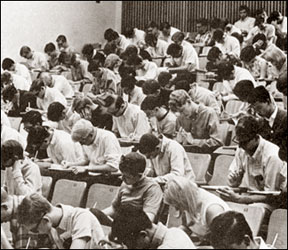Lankans proud to be literate
Over 861 million without access to literacy-EFA
Global Monitoring Report 2002:
by Rosanne Koelmeyer Anderson
 It is a cause for celebration. Sri Lanka's literacy rate stands at
91.6 per cent as recorded by the UNESCO Institute for Statistics ,July
2002 and its national literacy goal by 2010 is an estimated 98 per cent. It is a cause for celebration. Sri Lanka's literacy rate stands at
91.6 per cent as recorded by the UNESCO Institute for Statistics ,July
2002 and its national literacy goal by 2010 is an estimated 98 per cent.
This is great news with World Literacy Day falling on September 8 to
see where we stand as a nation. There are now close to four billion
literate people in the world , of all children, youth and adults.
Setting universal goals for enhancement of literacy rates are easier
said than done.
Inadequate resources, strategies and political will are the major
contributory factors towards slowing down the desired process and
achieving universal targets. However, the question remains, 'why hasn't
this been advantageous in reducing the national crime rate, drug abuse,
suicides and mental depression overall.
Despite all odds, the goal of the United Nations Decade of Education
for sustainable Development(2005-2014) for which UNESCO is the lead
agency is to integrate the principles ,values and practices of
sustainable development into all aspects of education and learning.
This educational effort will encourage changes in behaviour that will
create a more sustainable future in terms of environmental
integrity,economic viability and a just society for present and future
generations.
Literacy is about more than reading and writing - it is about how we
communicate in society. It is about social practices and relationships,
about knowledge, language and culture.
Literacy - the use of written communication - finds its place in our
lives alongside other ways of communicating. Indeed, literacy itself
takes many forms: on paper, on the computer screen, on TV, on posters
and signs.
Those who use literacy take it for granted - but those who cannot use
it are excluded from much communication in today's world.
Why is it that one in five people over the age of 15 cannot
communicate through literacy or take any part in the surrounding
literate environment? The EFA Global Monitoring Report 2002 spelled out
the scope of the challenge ? over 861 million people without access to
literacy.
Two thirds of these people are women, with illiteracy thus adding to
the deprivation and subordination to which women are already subject to.
In an interconnected world where literacy is a key to communication such
exclusion is unacceptable.
However, it is interesting to know where Sri Lanka stands after the
tsunami which affected many lives and many children have been deprived
of their basic necessities thus and are now paying the price with no
proper stream lining of needs. But, we are optimistic that we could
still maintain these figures despite the shortcomings.
The decade for literacy will focus on the needs of adults with the
goal that people everywhere should be able to use literacy to
communicate within their own community, in the wider society and beyond.
Literacy efforts have so far failed to reach the poorest and most
marginalised groups of people the Decade will particularly address such
populations, under the banner of Literacy for all: voice for all,
learning for all although literacy was recognised as a basic human right
over fifty years ago in the Universal Declaration of Rights.
The decade is said to be an opportunity to make a sustained
collective effort which will go beyond one-shot programmes or campaigns.
The Literacy Decade is also part of broader international work in
education and development. The Education for All (EFA) goal of
increasing literacy rates by 50% by 2015 provides the overall target for
the Decade, and the Millennium Development Goals.
Furthermore it is stated that policies must provide a framework for
local participation in literacy, including multilingual approaches and
freedom of expression. National policy environments must link literacy
promotion with strategies of poverty reduction and with programmes in
agriculture, health, HIV/AIDS prevention, conflict resolution and other
social concerns.
It was stated that the introduction of new policies for literacy will
be most effective when they are based on the results of empirical
research. This will answer questions such as: what is the long-term
impact of literacy? How can local communities better participate? What
is the extent of civil society engagement in literacy? Studies,
databases and papers will make the outcomes of this research widely
available.
It was further revealed that strong community ownership of the
purposes and processes of literacy would result in its effective use.
This requires good communication between government and communities,
inter-community networks, community learning centres and other ways of
ensuring that literacies are relevant and useful to people in their
daily lives and serve their aspirations while it was felt that better
literacy indicators are necessary to show what progress has been made
during the decade, both in terms of literacy rates and numbers, and in
terms of the impact of literacy.
UNESCO will work with its institutes and its partners to find
improved ways of measuring literacy, in local contexts and worldwide.
[email protected]
|
